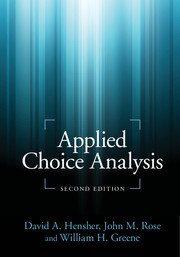Description
Applied Choice Analysis (2nd Ed.)
Authors: Hensher David A., Rose John M., Greene William H.
A fully updated second edition of this popular introduction to applied choice analysis, written for graduate students, researchers, professionals and consultants.
Language: English
Subject for Applied Choice Analysis:
83.43 €
In Print (Delivery period: 14 days).
Add to cart
Publication date: 06-2015
1216 p. · 17.6x24.6 cm · Paperback
1216 p. · 17.6x24.6 cm · Paperback
Description
/li>Contents
/li>Biography
/li>
The second edition of this popular book brings students fully up to date with the latest methods and techniques in choice analysis. Comprehensive yet accessible, it offers a unique introduction to anyone interested in understanding how to model and forecast the range of choices made by individuals and groups. In addition to a complete rewrite of several chapters, new topics covered include ordered choice, scaled MNL, generalized mixed logit, latent class models, group decision making, heuristics and attribute processing strategies, expected utility theory, and prospect theoretic applications. Many additional case studies are used to illustrate the applications of choice analysis with extensive command syntax provided for all Nlogit applications and datasets available online. With its unique blend of theory, estimation, and application, this book has broad appeal to all those interested in choice modeling methods and will be a valuable resource for students as well as researchers, professionals, and consultants.
Preface; Part I. Getting Started: 1. In the beginning; 2. Choosing; 3. Choice and utility; 4. Families of discrete choice models; 5. Estimating discrete choice models; 6. Experimental design and choice experiments; 7. Statistical inference; 8. Other matters that analysts often inquire about; Part II. Software and Data: 9. Nlogit for applied choice analysis; 10. Data set up for Nlogit; Part III. The Suite of Choice Models: 11. Getting started modeling: the workhorse - multinominal logit; 12. Handling unlabeled discrete choice data; 13. Getting more from your model; 14. Nested logit estimation; 15. Mixed logit estimation; 16. Latent class models; 17. Binary choice models; 18. Ordered choices; 19. Combining sources of data; Part IV. Advanced Topics: 20. Frontiers of choice analysis; 21. Attribute processing, heuristics, and preference construction; 22. Group decision making; Select glossary; References; Index.
David A. Hensher is Professor of Management, and Founding Director of the Institute of Transport and Logistics Studies (ITLS) at The University of Sydney Business School.
John M. Rose was previously Professor of Transport and Logistics Modelling at the Institute of Transport and Logistics Studies (ITLS) at the University of Sydney Business School and moved to The University of South Australia as co-director of the Institute for Choice in early March 2014.
William H. Greene is the Robert Stansky Professor of Economics at the Stern School of Business, New York University.
John M. Rose was previously Professor of Transport and Logistics Modelling at the Institute of Transport and Logistics Studies (ITLS) at the University of Sydney Business School and moved to The University of South Australia as co-director of the Institute for Choice in early March 2014.
William H. Greene is the Robert Stansky Professor of Economics at the Stern School of Business, New York University.
© 2024 LAVOISIER S.A.S.
These books may interest you

Higher Education Consumer Choice 58.01 €



